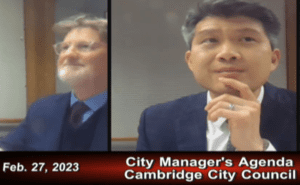Who is a member?
Our members are the local governments of Massachusetts and their elected and appointed leadership.

Since the pandemic began, communities such as Cambridge have made significant use of remote and hybrid technology. Pictured: Cambridge Deputy City Manager Owen O’Riordan (left) and City Manager Yi-An Huang participate in the Feb. 27 City Council meeting.
With a March 31 expiration looming, the MMA is advocating for a further extension of some pandemic-related authorizations, including options for remote and hybrid public meetings, town meetings and caucuses, as well as special provisions for expanded outdoor dining.
In 2020, the Legislature enacted temporary provisions during the COVID pandemic to enable cities and towns to maintain operations, conduct business, hold elections, create budgets and support local economies. The MMA has continued to advocate for these local options to be made permanent.
At the Feb. 14 meeting of the Local Government Advisory Commission, Pittsfield Mayor Linda Tyer discussed the urgency of extending the provisions while continuing to allow municipalities flexibility in determining which type of meeting — hybrid, remote or in-person — works best for each local board.
An MMA letter to House Speaker Ron Mariano and Senate President Karen Spilka on Feb. 24 also stressed the importance of maintaining consistency under the current authorizations, and requested an extension to July 1, 2024. With annual town meetings scheduled for the spring, and the outdoor dining season coming up quickly, extending current provisions would provide stability for local officials and business while allowing the Legislature time to deliberate permanent changes.
Current authorizations allowing municipalities to approve temporary permits to expand outdoor dining services are set to expire on April 1. The MMA argues that extending these authorizations would help to stabilize and support local restaurants, a business sector hit particularly hard by the pandemic.
While asking for an extension of current provisions, the MMA will continue to advocate for making the provisions permanent. The association is also raising concerns that a state mandate for hybrid local meetings would be untenable due to cost, staff and space constraints.